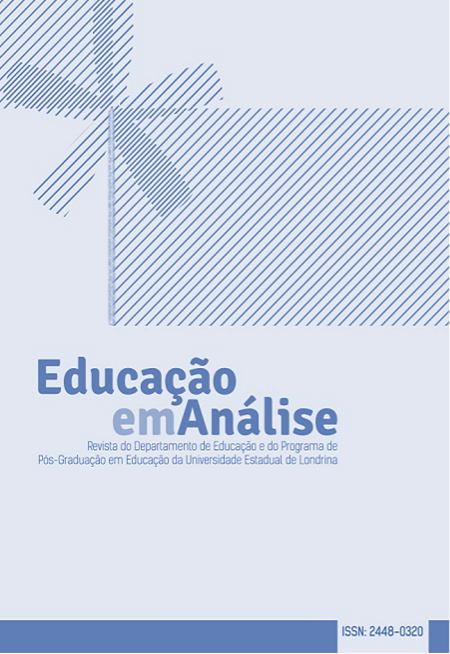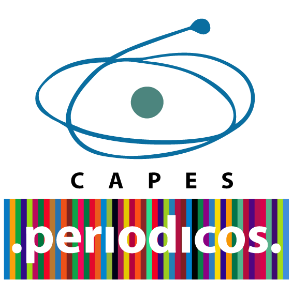La relación entre motivación y autorregulación del aprendizaje
DOI:
https://doi.org/10.5433/1984-7939.2019v4n1p69Palabras clave:
Autorregulación del aprendizaje, Estrategias de aprendizaje, Motivación para autorregulación, Teorías motivacionalesResumen
El artigo tuvo como foco presentar las maneras por las cuales los teóricos en la reciente historia de la Psicología Educacional consideraran las relaciones entre motivación y aprendizaje autorregulada. Más específicamente, fue presentada la literatura sobre constructos motivacionales que preceden y fomentan el aprendizaje autorregulado. Los investigadores han escogido tres modelos teóricos. Primero, fueran presentados y discutidos los resultados de investigaciones sobre las creencias de autoeficacia y su relación con aprendizaje autorregulado. Segundo, la Teoría de Metas de Realización inspiró muchos estudios y la meta de logro surgió más frecuentemente como asociada con aprendizaje autorregulado. Finalmente, algunas investigaciones con el enfoque de la Teoría de Autodeterminación proporcionaron evidencias sobre la relevancia de la calidad de la motivación. De los estudios fueran extraídas conclusiones, así como sugestiones para profesores en el contexto educacional.
Descargas
Citas
BANDURA, A. Self-efficacy: the exercise of control. New York: Freeman, 1997.
BERGER, J. L; KARABENICK, S. A. Motivation and students' use of learning strategies: evidence of unidirectional influences in mathematics classrooms. Learning and Instruction, Oxford, v. 21, n. 4, p. 416-428, 2011.
BOEKAERTS, M.; PINTRICH, P. R.; ZEIDNER, M. Handbook of self-regulation: theory, research, and applications. San Diego, CA: Academic Press, 2000.
BRADLEY, R. L.; BROWNE, B. L.; KELLEY, H. M. Examining the influence of self-efficacy and self-regulation in online learning. College Student Journal, Chula Vista, v. 51, n. 4, p. 518- 530, 2017.
BZUNECK, J. A. Emoções acadêmicas, autorregulação e seu impacto sobre motivação e aprendizagem. ETD - Educação Temática Digital, São Paulo, v. 20, n. 4, p. 1059-1075, out./dez. 2018.
BZUNECK, J. A.; BORUCHOVITCH, E. Motivação e autorregulação da motivação no contexto educativo. Psicologia: Ensino & Formação, Brasília, v. 7, n. 2, p. 73-84, 2016.
CAPRARA, G. V.; FIDA, R.; VECCHIONE, M.; DEL BOVE, G.; VECCHIO, G. M.; BARBARANELLI, C.; BANDURA, A. Longitudinal analysis of the role of perceived self-efficacy for self-regulated learning in academic continuance and achievement. Journal of Educational Psychology, Arlington, v. 100, n. 3, p. 525-534, 2008. DOI:10.1037/0022-0663.100.3.525.
DECI, E. L.; RYAN, R. M. Intrinsic motivation and self-determination in human behavior. New York: Plenum, 1985.
DONCHE, V.; MAEYER, S.; COERTJENS, L.; DAAL, T.; PETEGEM, P. Differential use of learning strategies in firstâ€year higher education: the impact of personality, academic motivation, and teaching strategies. British Journal of Educational Psychology, Leicester, v. 83, n. 2, p. 238-251, 2013.
DÖRRENBÄCHER, L.; PERELS, F. Self-regulated learning profiles in college students: their relationship to achievement, personality, and the effectiveness of an intervention to foster self-regulated learning. Learning and Individual Differences, Greenwich, v. 51, p. 229-241, 2016.
GUAY, F.; CHANAL, J.; RATELLE,C. F.; MARSH, H. W.; LAROSE, S.; BOIVIN, M. V. Intrinsic, identified, and controlled types of motivation for school subjects in young elementary school children. British Journal of Educational Psychology, Leicester, v. 80, p. 711-735, 2010.
GUIMARÃES, S. E. R. A organização da escola e da sala de aula como determinante da motivação intrínseca e da meta aprender. In: BORUCHOVITCH, E.; BZUNECK, J. A. (org.). A motivação do aluno: contribuições da Psicologia contemporânea. Petrópolis: Editora Vozes, 2018. p. 78-95.
HULLEMAN, C. S.; SCHRAGER, S. M.; BODMANN, S. M.; HARACKIEWICZ, J. M. A meta-analytic review of achievement goal measures: different labels for the same constructs or different constructs with similar labels? Psychological Bulletin, Washington, v. 136, p. 422-449, 2010.
LEE, W.; LEE, M.; BONG, M. Testing interest and self-efficacy as predictors of academic self-regulation and achievement. Contemporary Educational Psychology, San Diego, v. 39, n. 2, p. 86-99, 2014.
LINNENBRINK-GARCIA, L.; WORMINGTON, S. V.; SNYDER, K. E.; RIGGSBEE, J.; PEREZ, T.; BEN-ELIYAHU, A.; HILL, N. Multiple pathways to success: an examination of integrative motivational profiles among upper elementary and college students. Journal of Educational Psychology, Arlington, v. 110, n. 7, p. 1026-1048, 2018.
LIU, W. C.; WANG, C. K. J.; KEE, Y. H., KOH, C.; LIM, B. S. C.; CHUA, L. College students' motivation and learning strategies profiles and academic achievement: a self-determination theory approach. Educational Psychology, Dorchester on Thames, v. 34, n. 3, p. 338-353, 2014.
MAEHR, M. L.; MEYER, H. A. Understanding motivation and schooling: we'v been, where we are, and where we need to go. Educational Psychology Review, New York, n. 9, p. 371-409, 1997.
MATOS, L.; LENS, W.; VANSTEENKISTE, M.; MOURATIDIS, A. Optimal motivation in Peruvian high schools: should learners pursue and teachers promote mastery goals, performance-approach goals or both? Learning and Individual Differences, Greenwich, v. 55, p. 87-96, 2017.
MCCOMBS, B. L. Historical review of learning strategies research: strategies for the whole learner—a tribute to claire ellen weinstein and early researchers of this topic. Frontiers in Education, New Delhi, v. 2, n. 6, p. 1-21, 2017.
MOURATIDIS, A.; MICHOUB, A.; DEMIRCIOÄžLUC, A. N.; SAYILD, M. Different goals, different pathways to success: performance-approach goals as direct and mastery-approach goals as indirect predictors of grades in mathematics. Learning and Individual Differences, Greenwich,v. 161, p. 127-135, 2018.
MÃœLLER, N.; SEUFERT, T. Effects of self-regulation prompts in hypermedia learning on learning performance and self-efficacy. Learning and Instruction, Oxford, v. 58, p. 1-11, 2018.
NASCIMENTO, F. P. et al. Autorregulação e motivação em uma tarefa específica: uma abordagem centrada na pessoa. Estudos de Psicologia Campinas, Campinas, [2018]. No prelo.
PANADERO, E. A review of self-regulated learning: six models and four directions for research. Frontiers in Psychology, New Delhi, v. 8, p. 1-28, apr. 2017.
PAULINO, P.; SÁ, I.; SILVA, A. L. Autorregulação da motivação: crenças e estratégias de alunos portugueses do 7º ao 9º ano de escolaridade. Psicologia: Reflexão e Crítica, Porto Alegre, v. 28, n. 3, p. 574-582, 2015.
PINTRICH, P. R. The dynamic interplay of student motivation and cognition in the college classroom. In: AMES, C.; MAEHR, M. (ed.). Advances in motivation and achievement: motivation enhancing environments. Greenwich, CT: JAI Press, 1989. v. 6, p. 117-160.
PINTRICH, P. R. The role of goal orientation in self-regulated learning. In: BOEKAETS, M.; PINTRICH, P. R.; ZEIDNER, M. (ed.). Handbook of Self-Regulation: theory, research, and applications. San Diego, CA: Academic Press, 2000. p. 451-502.
PINTRICH, P.R. A motivational science perspective on the role of student motivation in learning and teaching contexts. Journal of Educational Psychology, Arlington, v. 95, p. 667-686, 2003.
PINTRICH, P. R. A Conceptual framework for assessing motivation and self-regulated learning in college students. Educational Psychology Review, New York, v. 16, n. 4, p. 385-406, 2004.
RYAN, R. M.; DECI, E. L. Self-Determination theory: basic psychological needs in motivation, development, and wellness. New York: Guilford Press, 2017.
SCHUNK, D. H.; MEECE, J. L.; PINTRICH, P. R. Motivation in education: theory, research, and applications. 4. ed. Boston: Mass, 2014.
SCHUNK, D. H.; ZIMMERMAN, B. Motivation and self-regulated learning: theory, research, and applications. New York: Taylor & Francis, 2008.
SENKO, C.; HULLEMAN, C. S. The role of goal attainment expectancies in achievement goal pursuit. Journal of Educational Psychology, Arlington, v. 105, n. 2, p. 504-521, 2013.
URDAN, T. Examining the relations among early adolescent students' goals and friends' orientation toward effort and achievement in school. Contemporary Educational Psychology, San Diego, v. 22, n. 2, p. 165-191, 1997.
USHER, E. L.; PAJARES, F. Self-efficacy for self-regulated learning: a validation study. Educational and Psychological Measurement, Durham, v. 68, p. 443-463, 2008.
VALLE, A.; CABANACH, R. G.; GONZÁLEZ-PIENDA, J. A.; NÚÑEZ, J. C.; RODRÍGUEZ, S.; ROSÁRIO, P. Perfiles motivacionales en estudiantes de secundaria: análisis diferencial en estrategias cognitivas, estrategias de autorregulación y rendimiento académico. Revista Mexicana de Psicología, Guadalajara, v. 26, n. 1, p. 113-124, 2009.
VANSTEENKISTE, M.; MOURATIDIS, A. Emerging trends and future directions for the field of motivation psychology: a special issue in honor of prof. dr. Willy Lens. Psychologica Belgica, Louvain, v. 56, n. 3, p. 118-142, 2016.
VANSTEENKISTE, M.; SIERENS, E.; SOENENS, B.; LUYCKX, K.; LENS, W. Motivational profiles from a self-determination perspective: the quality of motivation matters. Journal of Educational Psychology, Arlington, v. 101, p. 671-688, 2009.
WEINSTEIN, C. E.; MAYER, R. E. The teaching of learning strategies. In: Wittrock, M. C. (ed.). Handbook of research on teaching. New York: McMillan Publ. Co., 1986. p. 315-327.
WEINSTEIN, C. E.; ACCE, T. W.; JUNG, J. Self-regulation and learning strategies. New Directions for Teaching and Learning, San Francisco, v. 126, p. 45-53, 2011.
WOLTERS, C. A. Advancing achievement goal theory: using goal structures and goal orientations to predict students' motivation, cognition, and achievement. Journal of Educational Psychology, Arlington, v. 96, n. 2, p. 236-250, 2004.
ZIMMERMAN, B. J. Attaining self-regulation: a social cognitive perspective. In: BOEKAERTS, M.; PINTRICH, P. R.; ZEIDNER, M. (ed.). Handbook of self-regulation: theory, research, and applications. San Diego, CA: Academic Press, 2000. p. 13-39.
ZIMMERMAN, B. Investigating self-regulation and motivation: historical background, methodological developments, and future prospects. American Educational Research Journal, Washington, v. 45, n. 1, p. 166 -183, 2008.
ZIMMERMAN, B. J. From cognitive modeling to self-regulation: a social cognitive career path. Educational Psychologist, Hillsdale, v. 48, n. 3, p.135-147, 2013.
ZIMMERMAN, B. J.; MARTINEZ-PONS, M. Student differences in self-regulated learning: relating grade, sex, and giftedness to self-efficacy and strategy use. Journal of Educational Psychology, Arlington, v. 82, p. 51-59, 1990.
ZUSHO, A. Toward an integrated model of [self-regulated] learning in the college classroom. Educational Psychology Review, New York, v. 29, p. 301-324, 2017.
Descargas
Publicado
Cómo citar
Número
Sección
Licencia
Derechos de autor 2019 Educação em Análise

Esta obra está bajo una licencia internacional Creative Commons Atribución 4.0.
Os artigos publicados na Revista Educação em Análise estão sob a Licença Creative Commons Atribuição 4.0 Internacional, garantindo Acesso Aberto. Deste modo, os autores mantêm os direitos autorais de seus trabalhos e, em caso de republicação, solicita-se que indiquem a primeira publicação nesta revista. Essa licença permite que qualquer pessoa leia, baixe, copie e compartilhe o conteúdo, desde que a devida citação seja feita. Além disso, autoriza a redistribuição, adaptação e criação de obras derivadas em qualquer formato ou meio, incluindo uso comercial, desde que a atribuição à revista seja mantida.
A revista se reserva o direito de efetuar, nos originais, alterações de ordem normativa, ortográfica e gramatical, com vistas a manter o padrão culto da língua e a credibilidade do veículo. Respeitará, no entanto, o estilo de escrever dos autores. Alterações, correções ou sugestões de ordem conceitual serão encaminhadas aos autores, quando necessário.
As opiniões emitidas pelos autores dos artigos são de sua exclusiva responsabilidade.
























